She quoted activist
to celebrate a federal judge’s order requiring a Colorado school district to reinstate 19 previously banned books, books often centered on sexuality, race, and postmodern identity theory. The implication was unmistakable: this was not merely a legal ruling; it was, in her view, a moral triumph. Her message to dissenters was smug in its simplicity: “You don’t like it, don’t read it.”Yet within minutes of me posting a respectful and affirming comment—yes, affirming—I was blocked. Silenced. Erased.
My reply was not contrarian. It was not caustic. It was not even a disagreement. I wrote, “Absolutely. I fully agree—the Bible, along with the most compelling works of apologetics, deserves a prominent place in every school library.” I followed this with a link to an op-ed I authored, Christianity: A Light in History’s Shadows, offering a historical and philosophical case for why Scripture belongs among the pantheon of important texts in any educational environment. Immediately thereafter I added the same comment alongside another piece: Why Western Civilization Is Morally, Culturally, and Philosophically Superior to the Islamic World as It Exists Today.
My tone was civil. My argument was rooted in facts. My approach was inclusive.
What happened next?
Jenny Donovan blocked me from the conversation.
The woman who boldly proclaimed “no book bans—ever” had no problem placing an intellectual muzzle the moment a worldview she dislikes, or perhaps fears, entered her curated echo chamber. She did not rebut. She did not dialogue. She deleted. She disconnected. She disappeared me.
This is not merely hypocrisy—it is the kind of Orwellian doublespeak that now masquerades as progressivism. Let us dwell for a moment on this bitter irony: those who speak loudest about inclusion and openness are often the first to exile ideas that challenge their comfort. Jenny’s “No book bans” is not about liberty. It is about control. Control of narrative. Control of morality. Control of access.
In Jenny Donovan’s world, “freedom of speech” means freedom to repeat her talking points. “Intellectual diversity” means the presence of many colors, creeds, and sexual orientations—all saying the exact same thing. “Tolerance,” to her, is a mirror: if you reflect her image back to her, you may speak. If you do not, you are shunned.
This is not a trivial incident. It is a microcosm of a larger, metastasizing contradiction infecting our discourse.
Let us interrogate her creed: “You don’t like it, don’t read it.” Fine. But does that also apply to The Bible? To Mere Christianity? To The Case for Christ? To I Don’t Have Enough Faith To Be An Atheist? Or do we now draw lines around books that question cultural relativism or reassert absolute moral frameworks? When did we decide that graphic novels about gender transitions and images of sexual acts are brave and necessary, but the moral witness of Scripture is dangerous and archaic?
Consider this: The Bible remains the most widely read, studied, and published book in human history, translated into over 3,000 languages, influencing the foundation of Western legal systems, human rights doctrines, and ethical norms. Harvard, Yale, and Princeton were all founded on biblical principles. Even critics like Nietzsche and Sartre were forced to grapple with the magnitude of its influence. And yet, for the modern Left, it is often treated as an artifact of oppression, unworthy of shelf space in the institutions it helped birth.
When I posted in favor of its inclusion—in full agreement with Jenny’s public posture—another commenter,
, (@frankiecee), promptly responded: “That book is one of the most inappropriate ones for children.” I asked her to elaborate. Her reply: “Oh IDK. Maybe it’s all the rape, murder, incest, and slavery.”This is where selective ignorance and willful malice meet. Shall we then remove The Iliad? The Odyssey? The Bluest Eye? Beloved? A Clockwork Orange? The Handmaid’s Tale? Gender Queer? These are all deeply disturbing, graphic, and complex. And yet, they are not only permitted—they are celebrated.
Here is the intellectual rot: the Bible is not disturbing because it endorses evil, but because it confronts it. Like Shakespeare, it captures the full panorama of human depravity—not to glorify it, but to reveal it, condemn it, and ultimately redeem it. It tells the truth about humanity, which is why it endures. It is not a children’s cartoon. It is a mirror held up to mankind, and that is precisely what literature is supposed to do.
But Francesca’s logic is not about literary merit. It is about ideological immunity. Books that align with the progressive moral script are protected. Books that do not are slandered and slashed. It is not about “what is appropriate.” It is about who is in power to decide what counts as appropriate.
The Colorado case Jenny referenced dealt with books such as The Bluest Eye by Toni Morrison, which depicts incest and rape in haunting detail. I do not argue that it should be banned. I argue it should be engaged with. But what I will not accept is a double standard where the Bible—whose literary, historical, philosophical, and moral impact is unparalleled—is treated as dangerous while modern ideological manifestos are hailed as sacred.
The hypocrisy is intolerable.
Case in point: In what began as a respectful rebuttal,
—a retired English teacher—offered a measured, fact-based perspective on the role of school boards in determining age-appropriate material. Her argument was simple: school districts have the responsibility to curate content suitable for children, and parents still retain full access to any removed material through public libraries. She affirmed that yes, there are indeed books that are inappropriate for school-aged children, and that deciding such matters is well within a district’s prerogative.But instead of replying in kind, Jenny Donovan opted for a thinly veiled venom masked as intellectual superiority. Rather than engaging with Millen’s argument, she dismissed her respectfully worded comment with a passive-aggressive retort—“allow me to do your homework for you, retired English teacher”—before launching into a condescending monologue. Ironically, she championed critical thinking and open dialogue while modeling neither.
What could have been a constructive conversation about boundaries, values, and educational responsibility quickly deteriorated into ideological grandstanding. Jenny accused others of refusing to think critically while refusing herself to engage with the actual point being made.
C. M. Millen extended a hand.
Jenny returned fire.
Let me be clear: I did not enter Jenny Donovan’s thread with hostility. I entered with agreement, extending the scope of her premise to include texts that have stood the test of time and shaped the soul of civilization. And I was met with exile.
To those watching, this is not about me. This is about a culture at war with itself. The slogan “No book bans. Ever.” is not an expression of freedom. It is a smokescreen for authoritarian curation. It means: no bans—unless your book is Christian, conservative, or critical of fashionable orthodoxy.
This is what Orwell warned of: language weaponized to conceal the opposite of what it proclaims. “Freedom is slavery. Ignorance is strength. No book bans.”
If we mean what we say about liberty—if we still believe in pluralism, in the value of disagreement, in the refining fire of discourse—then we must have the courage to let all voices speak, not just those we like. That includes voices from the past. Voices of faith. Voices that call us to account.
Because if liberty only exists for those already seated at the table of popular consensus, then it is no longer liberty at all. It is curated thought. It is emotional despotism. It is the tyranny of the algorithm and the ban button, disguised in pastel emojis.
Jenny Donovan did not ban a book.
She banned me. She banned dialogue. She banned dissent.
She proved what far too many on the modern Left embody: inclusion as costume, censorship as creed.
That is not progress. That is regression. That is how cultures rot—from the inside out, not with a bang but with a block.
So the next time you hear someone cry, “No book bans—ever,” ask them:
Do you mean it? Or do you just mean your books?
Because I mean it.
And I will keep speaking.
Even if you try to delete me.
Postscript added specifically for
in reply to her rebuttal noted above and requoted below, (since I am unable to post on the actual thread now):“Oh IDK. Maybe it’s all the rape, murder, incest, and slavery.” - Francesca Cee
-
Francesca, if moral danger lies in the presence of evil, then no child should study history, literature, or human behavior at all. But if moral growth lies in confronting evil honestly—through the lens of justice, truth, and redemption—then there is no book more vital than the Bible.
The objection that the Bible contains rape, murder, incest, and slavery is not an argument against the Bible—it is an argument for its honesty. The Bible does not sanitize the human condition. It lays it bare. It does not present moral ideals in a vacuum, but rather within the chaos and depravity of a fallen world. The same world we still inhabit. That is precisely what makes it indispensable.
Unlike modern media that often glamorizes or trivializes evil, the Bible presents these acts with moral clarity. Rape is never condoned. Murder is condemned. Incest is described with shame and consequence. Slavery is regulated in the Old Testament with protections unheard of in ancient legal systems, and ultimately subverted by the radical dignity of every person made in the image of God—a concept that only the Bible introduces into human thought at that level. It is this same text that fueled the abolitionist movement, inspired the civil rights movement, and birthed the West’s entire moral framework.
Should a child read the Song of Solomon as a toddler? No. Should a child understand the raw consequences of David’s sin, the pain of Cain’s jealousy, or the suffering of Joseph’s betrayal? Yes. Because the Bible is not pornography for the curious. It is truth for the broken.
To say the Bible is inappropriate for children because it contains evil is like saying a hospital is inappropriate for the sick because it contains disease. It is precisely because the Bible contains the full spectrum of human experience—sin, justice, mercy, redemption—that it is the most appropriate book for developing a moral compass.
Do you want children to be shocked by evil, or shaped to recognize it, resist it, and respond with wisdom? Then you must expose them to stories where light and darkness are not equal players, but where light ultimately prevails. That is the story of the Bible.
And to remove that book from the reach of young minds is not to protect them—it is to disarm them.

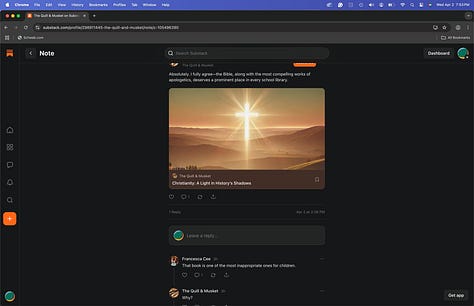
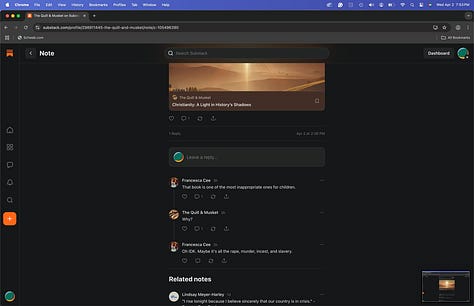
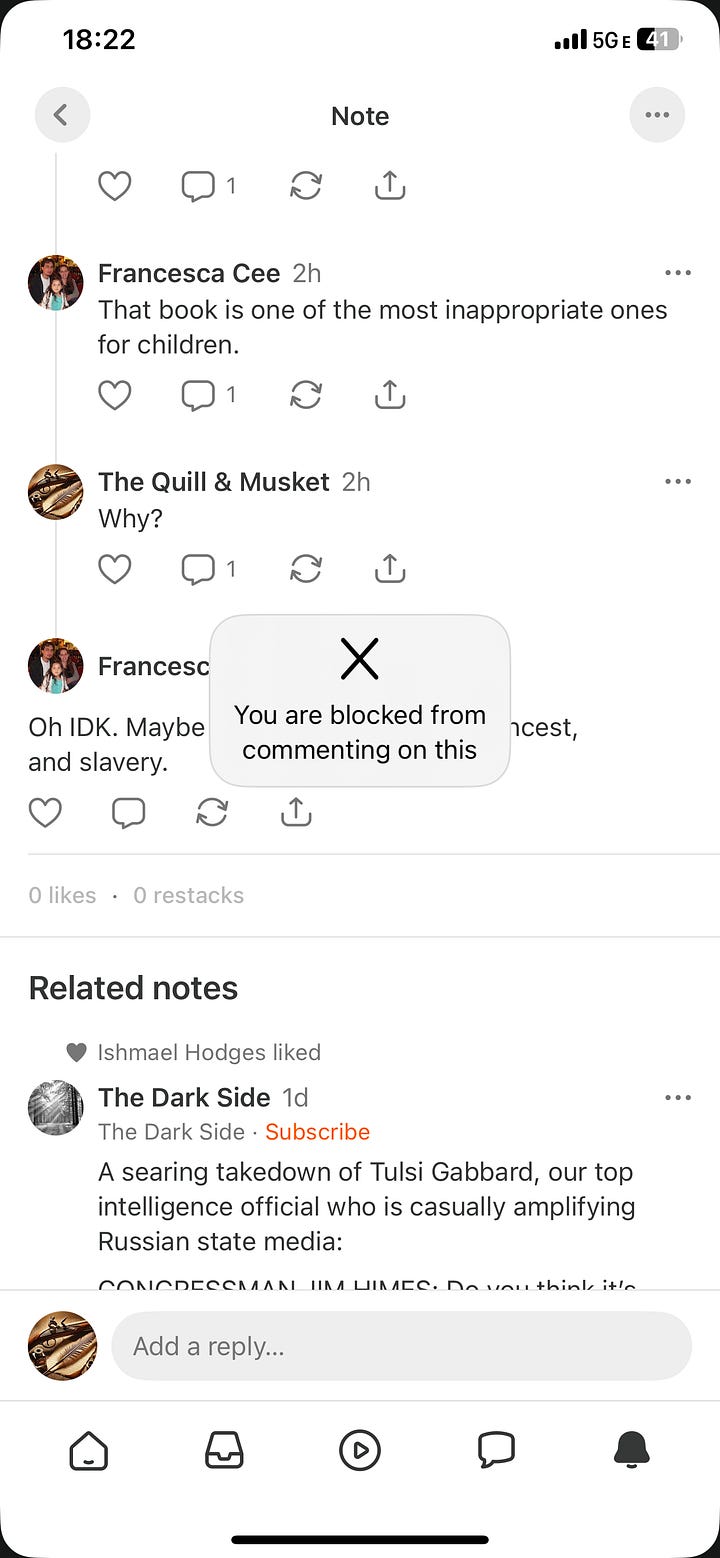
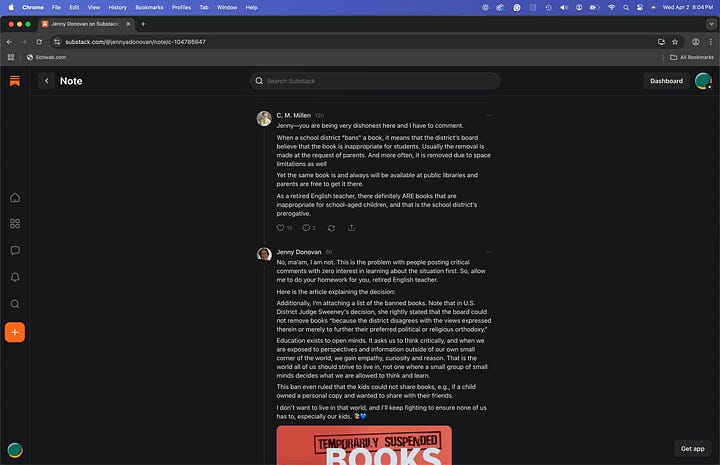


UPDATE: And just like that, Francesca responded with hostility—admitting she had not fully read what I wrote before launching into a string of hateful and ignorant remarks. That is not a rebuttal; it is a confession. She is not challenging the ideas—I suspect she is avoiding them.
Had she read carefully, she might have to confront the unsettling possibility that her worldview rests more on slogans than on substance. Mockery in place of argument is not strength—it is camouflage for intellectual retreat.




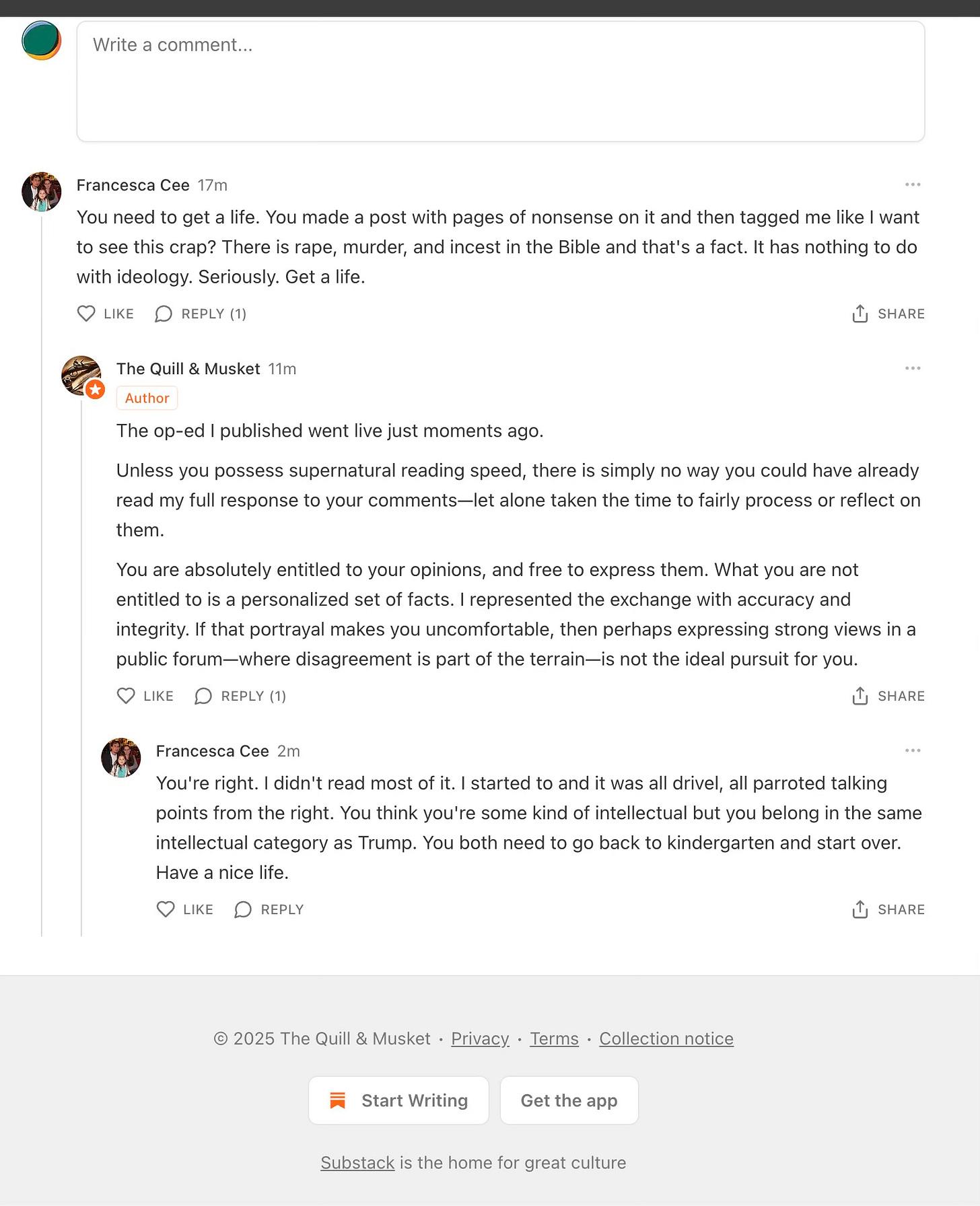
You need to get a life. You made a post with pages of nonsense on it and then tagged me like I want to see this crap? There is rape, murder, and incest in the Bible and that's a fact. It has nothing to do with ideology. Seriously. Get a life.